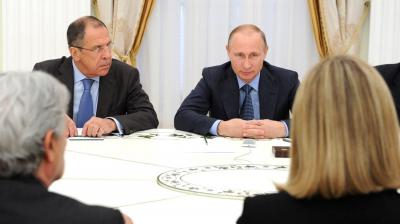US ambassador to NATO, Ivo H. Daalder, and NATO's supreme allied commander, Adm. James G. Stavridis, argued last May that NATO's "victory" in Libya was a "model intervention (...) The first lesson is that NATO is uniquely positioned to respond quickly and effectively to international crises." If so, why is NATO still a passive by-stander while the conflict in Syria is turning into a civil war? There are numerous reasons why a military intervention may be considered. The humanitarian catastrophe - a death toll of up to 17.000, and half a million displaced people inside Syria - certainly matches that of Libya, a few years earlier. Terrorist groups like Hezbollah and Al Qaida are actively supporting the Syrian rebellion, radicalizing a protest movement that began with a deeply felt discontent with the Assad regime.
On top of these concerns, Syria has officially acknowledged its stockpile of chemical weapons (sarin and mustard gas, and possibly VX and cyanide). What if these weapons of mass destruction should fall into terrorist hands? Moreover, on June 22, Syria shot down a Turkish fighter jet, having flown over its territorial waters in the Mediterranean Sea, near the coastal province of Latakia. Which raises the question whether today's Syria evokes the Responsibility to Protect doctrine (on humanitarian grounds), or triggers a Duty to Prevent (on security grounds)? US Chairman of the Joint Chiefs of Staff Gen. Martin Dempsey, suggested (in May 2012): "You'll always find military leaders to be somewhat cautious about the use of force, because we're never entirely sure what comes out on the other side. (...) But that said, it may come to a point with Syria because of the atrocities." Has this point been reached this summer?
Surely not. NATO has smartly steered clear from any involvement in Syria - at least until now. Turkey's flirtations with a possible NATO role in Syria (during the jet crisis) has been dodged by calling for political consultations based on the Alliance's Article 4, rather than framing the event an Article 5 (collective defense) situation. A NATO-led military intervention in Syria would be unwelcome for at least five reasons. First, as long as Assad is in power, a United Nations Security Council mandate will not be granted by either Russia or China. Both these global powers have learned their lesson from Libya, where a mandate for installing a no fly zone resulted in NATO-led regime change. Second, the absence of a legal mandate to intervene is not just a procedural inconvenience. Both Russia and China have geostrategic and economic reasons to keep NATO and the West out of Syria. Both the Russian and Chinese navy have upgraded their presence in the eastern Mediterranean. Officially, this has been part of a large-scale maritime war game, also including Syria and Iran. The message is however unmistakably clear: don't mess with Syria!
Third, the current Syrian imbroglio is even more messy and ambiguous than Libya in 2011. As US Ambassador Daalder rightly argued: "Unlike Libya, you don't have pockets of the country that can be protected by civilian protection zones. You've got security forces intermingled with the population, and that introduction of greater military intervention from outside or arms to groups within Syria could further militarize the conflict in a counterproductive way." Fourth, NATO's involvement in the deconfiture of the Assad regime will give it more responsibility for the future handling of the country than it can deal with. US Secretary of Defense Panetta recently argued that in any post-Assad scenario, Syria should "maintain as much of the military, the police, along with the security forces, and hope that they will transition to a democratic form of government. That's a key."
The problem with this assessment is that the US and NATO have little to no influence on Syria's future. As former international high representative for Bosnia and Herzegovina, Lord Ashdown suggested: "The worry for me is not just the tragedy and the bloodshed and the horror that' s going on in the cities of Syria but also the possibility of a widening Sunni-Shia conflict which could engulf the whole of the Middle East and would have global consequences." This is not a conflict NATO should get itself into. Fifth, NATO involvement in Syria would tie the Alliance down for years to come, sapping its political and military energy. A NATO presence in Syria would drag the Alliance into the Sunni-Shia conflict predicted by Lord Ashdown (Syria is 75% Sunni; Iran is 90% Shia). This would, however, make it unlikely for NATO to face its main strategic challenge: a nuclear Iran.
All in all, the case against NATO involvement in Syria should be clear. Unfortunately, international politics has proven to be resistant to logic and strategic rationality. So I keep my fingers crossed.
*This is an opinion piece written by Peter Van Ham and does not reflect the views of We-NATO, the North Atlantic Treaty Organization, or any other institution.




